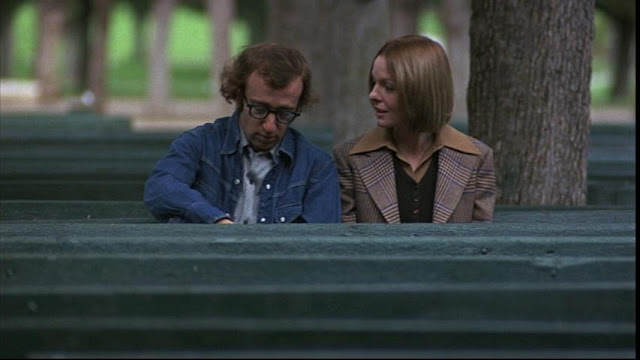Play It Again, Sam
Perhaps the best portrait of the Woody Allen persona is to be found in a film he didn't direct, 1972's PLAY IT AGAIN, SAM. He adapted his Broadway play for the screen, under the very capable direction of Herbert Ross, whose career alternated between audience pleasers like STEEL MAGNOLIAS and more curious fare like PENNIES FROM HEAVEN. Woody's patently uncertain nebbish was truly cemented in this film, which concerns our hero Allan Felix, a film critic/buff in San Francisco with a particular fondness for Humphrey Bogart, enough to constantly imagine that the actor is giving him advice on women. In his apartment, in the grocery store, on the street.
Felix's wife left him a few years earlier. She called him a "watcher" rather than a "doer." She's not incorrect, and Allan's apartment has evidence of an inveterate film buff in every corner. He'd rather crouch in dark cinemas than try to date again, especially because he's so awesomely bad at it. His friends Dick (Tony Roberts) and Linda (Diane Keaton) repeatedly try to pair him with someone who doesn't find him repulsive. Allan's neuroses always take over, often leaving destruction and too much cologne in their wake. Will Allan Felix ever find the right partner?
PLAY IT AGAIN, SAM gives plenty of screen time to Roberts and Keaton, both of whom would go on to collaborate with Allen numerous times. They are quite good, creating believably flawed individuals rather than just caricatures for easy jokes, though the running gag involving Dick's leaving of phone numbers is damned funny. Both play off Woody very well, and as the film continues it becomes obvious that the almost-as-neurotic Linda seems more compatible for Allan than her driven husband Dick. How this develops and concludes is just wonderful. The third act of the film really soars. The scene where Bogart (Jerry Lacey) coaches Allan as he sits next to Linda is a little comedy classic in itself.
But all of PLAY IT AGAIN, SAM, nicely expanded from the stage, is a delight. The physical and verbal gags come off perfectly, and the latter are jokes that many viewers can appreciate. Not too cerebral. This movie is one of "the early, funny ones" referenced in Allen's later STARDUST MEMORIES, and has a mainstream (for its time) appeal that unsurprisingly made it a box office hit. Today's viewers may blanch at some of the humor, including a few casual rape jokes, but that was the era. The numerous fantasy sequences (Felix's daydreams) range from smiling inducing to laugh out loud.
It must also be mentioned that Owen Roizman's cinematography and compositions are gorgeous, perfectly capturing several SF locations. And how refreshing to see Woody somewhere besides NYC.
Felix's wife left him a few years earlier. She called him a "watcher" rather than a "doer." She's not incorrect, and Allan's apartment has evidence of an inveterate film buff in every corner. He'd rather crouch in dark cinemas than try to date again, especially because he's so awesomely bad at it. His friends Dick (Tony Roberts) and Linda (Diane Keaton) repeatedly try to pair him with someone who doesn't find him repulsive. Allan's neuroses always take over, often leaving destruction and too much cologne in their wake. Will Allan Felix ever find the right partner?
PLAY IT AGAIN, SAM gives plenty of screen time to Roberts and Keaton, both of whom would go on to collaborate with Allen numerous times. They are quite good, creating believably flawed individuals rather than just caricatures for easy jokes, though the running gag involving Dick's leaving of phone numbers is damned funny. Both play off Woody very well, and as the film continues it becomes obvious that the almost-as-neurotic Linda seems more compatible for Allan than her driven husband Dick. How this develops and concludes is just wonderful. The third act of the film really soars. The scene where Bogart (Jerry Lacey) coaches Allan as he sits next to Linda is a little comedy classic in itself.
But all of PLAY IT AGAIN, SAM, nicely expanded from the stage, is a delight. The physical and verbal gags come off perfectly, and the latter are jokes that many viewers can appreciate. Not too cerebral. This movie is one of "the early, funny ones" referenced in Allen's later STARDUST MEMORIES, and has a mainstream (for its time) appeal that unsurprisingly made it a box office hit. Today's viewers may blanch at some of the humor, including a few casual rape jokes, but that was the era. The numerous fantasy sequences (Felix's daydreams) range from smiling inducing to laugh out loud.
It must also be mentioned that Owen Roizman's cinematography and compositions are gorgeous, perfectly capturing several SF locations. And how refreshing to see Woody somewhere besides NYC.



Comments